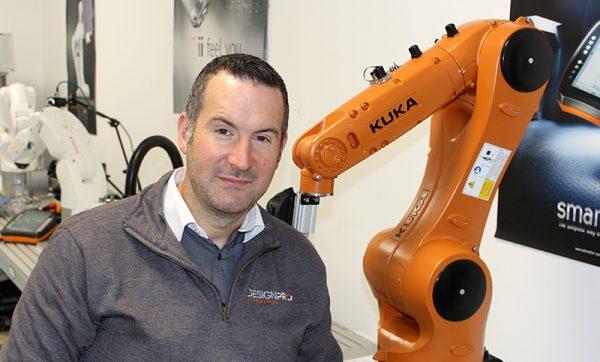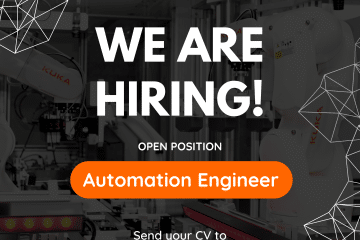Paul Collins, Managing Director of DesignPro pictured with KUKA robot and controller-min-min
In July we successfully secure funding for a €260,000 project through Enterprise Ireland’s ‘Innovation Partnership Programme’. The 24 month project will see DesignPro working in conjunction with the University of Limerick to further develop a robotic solution to endoscopy that aims to improve patient safety, implement remote real-time control of the endoscope and further develop the passive safety system which assists the surgeon during the endoscopic procedure.
The new robotic system will have passive safety features preventing sudden movements: a significant safety hazard in the existing manual procedure. It will record all surgeon input, allowing a database of successful procedures to be captured that can later be leveraged to improve training.
Recently endoscopic procedures in Irish hospitals have become a major story and area for concern across national media. Some issues that have been highlighted around the reliability and accuracy of these procedures are often down to human error or over-dependence on a few highly skilled operators. While there is training in place, opportunities for improvement and increased safety can be realised through the use of automated solutions and robotics as proposed in this project.
The technological capabilities to develop a system of this type have only recently become available due to the release of the KUKA Medical LBR. KUKA are one of the global, leading Robot manufacturers in the world and DesignPro acts as their exclusive ‘Official Systems Partner’ in Ireland. This project will enable DesignPro to continue to build on their expertise as robotic integrators in the important field of medical robotics. Now with over 40 KUKA robots of various payloads and applications integrated successfully into automated processes, DesignPro is well on its way to establishing itself as a leading company in this space.
The newly funded project stems from a longer-standing legacy project originally started by the late Dr. Paul O’Byrne who has been titled a top surgeon and medical ‘architect’ since his untimely passing in May last year. He is warmly remembered and appreciated for his significant input and contributions to the medical community and development of Barrington’s hospital in Limerick which is now under the stewardship of the Bon Secours Health System. Dr. O’Byrne was considered a true pioneer for medical advancements, embracing new technologies and capabilities made possible by automation and robotics. It was this forward thinking and drive for continual improvement that led to the original seed for this project to be planted by Dr. O’Byrne back in 2015 when he brought DesignPro on board to build out the first stage of the project.
Paul Collins, Managing Director of DesignPro had the following to say on the news of the funding application being approved:
“The links with the University of Limerick are very important here as it gives us the opportunity to work with their Robotics division who bring a wealth of knowledge and expertise to the table.”
And also directly from Paul Collins:
“There is a massive loss of Paul O’Bryne in this as he was a real ‘live-wire’ force and extremely passionate about trying to get this project done. Now having gotten the fantastic news that we have secured the funding to take this to the next stage, it’s very important to us that as this progresses and grows, the solution we’re developing retains the ‘POB’ name, the ‘Paul O’Byrne’, as a legacy to him.”
Declan McGee, Manager of Enterprise Ireland’s Innovation Partnership Fund, had the following to say on the announcement:
“Human-Robotic Collaboration is an increasingly important component of industrial automation and the expertise and knowledge gained in this Innovation Partnership Project will not only benefit DesignPro’s offering to the medical sector but can cross over into a number of other industries in Ireland.”
Medical robotics is a nascent field that offers significant opportunities for Irish industry. It is projected to grow significantly into the future and this project offers an excellent opportunity to innovate in this space and establish Ireland as an international centre of medical robotics excellence.





